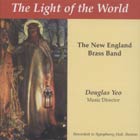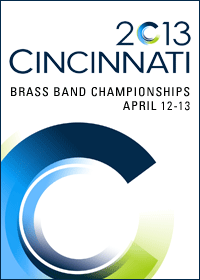 The Light of the World
The Light of the World
9-Feb-2005
The New England Brass Band
Conducted by Douglas Yeo
NEBBCD103
Total playing time: 58.51 mins
Founded by William Rollins as recently as 1988, the New England Brass Band has been led by Doug Yeo, bass trombone with the Boston Symphony Orchestra, since 1998. Many of the players come from a Salvation Army background, so it is perhaps appropriate that the repertoire on this, their third commercial recording, should also have strong Salvation Army connections. The programme includes two items (William Gordon's "Fortress" and Stephen Bulla's "Images for Brass" ) that formed part of their winning performance in the Challenge Section at the North American Brass Band Association's National Championship in April 2004.
The opening hymn tune "Old Hundredth" reveals a band with a light tone, but also a warmer sound than some American bands. Moving on to Dean Goffin's classic "The Light of the World" , there is some smooth, sustained playing, particularly in the first statement of the tune "Aurelia" . It is a straightforward reading with no gimmicks, built on a solid foundation from the lower half of the band, and with a real attempt to play quietly when called upon to do so.
William Gordon's "Fortress" is a prelude, fugue and chorale based on Luther's great hymn "A mighty fortress is our God" . It has an unmistakably American quality that is hard to define, with lively figures and prominently scored percussion. It is a fresh, powerful setting that has not been recorded very often, although the nature of the writing does highlight some intonation problems, especially in the cornets, and the climaxes sound a little strained.
Dean Goffin's "Crusaders" is built around the tune "Ascalon" , commonly known as "The Crusaders' Hymn" . It is a long and testing march, requiring considerable stamina, and the band does tire a little towards the end. The pace sounds a little steady on a first hearing, but it does allow the music room to breathe and enables the detail to be heard.
Principal Cornet and Associate Conductor Terry Everson is featured in James Curnow's reflective setting of the traditional Irish melody of "Slane" : "Be thou my vision" . It proves an apt pairing and the solo line stands out clearly from the band's sympathetic accompaniment.
Stephen Bulla's "Images for Brass" was written to mark the 50th anniversary of the Battle of Iwo Jima, and was premiered by the brass choir of the US Marine Band. Its four movements consist of a Prologue, Approach by Sea, Chorale Prayer (featuring the sailor's hymn "Melita" ) and Engagement, which includes references to "The Star-Spangled Banner" and contains some very telling percussion writing. The band responds valliantly to this challenging music, and it clearly struck a chord with the adjudicators as well.
There have been numerous arrangements of the tune "Nicea" : in "Holy, holy, holy" James Curnow concentrates on the contrasting texts in a three-verse setting, with a very subdued second verse, building in warmth and intensity for the third before subsiding into a calm, peaceful ending.
For Andrew Mackereth's "Swing Low" Terry Everson takes up the baton to allow Doug Yeo to play the bass trombone solo, featuring what Andrew (no mean trombonist himself) describes as "Quite the most fiendish trombone writing I have been guilty of!" The solo was requested by the Amsterdam Staff Band, who included it on their cd "Rejoice, the Lord is King" . Doug's version is at least the third in its brief life,as it has also been recorded by Coventry City Band. Doug nails the solo part spectacularly, whilst the band seem to catch his enthusiasm, springing to life with a spirited accompaniment, complete with clapping against the trombone's quasi-improvisatory line - definitely the highlight of the disc!
The role of Erik Leidzen in the development of both wind and brass music in the USA should never be under-estimated, and it is good to have his setting of "Sweet hour of prayer" included. It displays his customary craftsmanlike approach, clothing a fairly straightforward melody with effective suspensions and at times chromatic harmonies.
Based on his own lively song "Hallelujah to the Lamb" Philip Catelinet's cornet trio "The Heralds" puts the soloists through their paces with a vengeance. The solo lines frequently overlap as each takes the spotlight in turn, but Terry Everson, Dennis Caron and John Appleby show they are up to the challenge.
The sleeve notes credit John Philip Sousa with having composed 136 marches, many of which were commissioned to mark specific events. "The Salvation Army" could not by any stretch of the imagination be described as vintage Sousa, even when given a helping hand by Ray Steadman-Allen: it is pleasant enough, with its inclusion of "O boundless Salvation" , complete with a running bass part reminiscent of many early Salvation Army marches, but it ends very abruptly, as if he had run out of inspiration or time (or both!).
Terry Everson turns composer/arranger with "In dulci jubilo" , a setting of the familiar Christmas melody "Good Christian men rejoice" : juxtaposing phrases of the tune in different rhythms it makes for an effective, if unusual programme item that would enhance any band's Christmas concert. Much more familiar is James Curnow's "A psalm of praise" , featured in concerts by a number of bands even before Salvation Army music was officially made available to "outside" bands. The distinctive repeated rhythmic figures of the opening and throughout are kept very crisp, although the bass ostinato seems a little too deliberate. The band again seems to relish the challenge of the writing, even if the final statement of the tune sounds rather forced.
The benediction comes in the form of another arrangement from the pen of Willam Gordon, this time of Vaughan Williams' tune "Randolph" , associated with the words "God be with you till we meet again" . Opening quietly with muted cornets, the music gradually builds to a dramatic conclusion with an unusual suspension resolving into the final chord.
The recording took place over two sessions a year apart, with several changes of personnel, but the listener would not be aware of that. Doug Yeo has provided helpful sleeve notes covering not only the music itself but also a brief overview of the development of the brass and in relation to sacred music. As for the playing itself there is much to enjoy, even if the impression given is of a work in progress rather than the finished article: there are momentary lapses, with intonation and clarity suffering at times, but the enthusiasm and commitment of the players is plain to hear. It is good to have the opportunity to hear how bands are developing across the Atlantic, and if the programme is of interest then this disc is well worth exploring, with "Swing Low" being the undoubted highlight.
Peter Bale
What's on this CD?
1. Old Hundredth (Psalm 100), Geneva Psalter, 1511, 0.43
2. The Light of the World, Sir John Dean Goffin, 6.18
3. Fortress, William Gordon, 4.36
4. March: Crusaders ("Fairest Lord Jesus"), Sir John Dean Goffin, 7.25
5. Be Thou My Vision, Terry Everson, cornet solo, Traditional Irish Melody, arr. James Curnow, 2.32
6. Images for Brass, Prologue — Approach by Sea — Chorale Prayer ("Eternal Father Strong to Save") — Engagement, Stephen Bulla, 9.31
7. Holy, Holy, Holy, John Dykes, arr. James Curnow, 3.15
8. Swing Low, Douglas Yeo, bass trombone solo Terry Everson, conductor, arr. Andrew R. Mackereth, 3.22
9. Sweet Hour of Prayer, William Bradbury, arr. Erik Leidzen, 2.48
10. The Heralds ("Hallelujah to the Lamb!"), Terry Everson, Dennis Caron, John Appleby, cornet trio, Philip B. Catelinet, 4.08
11. March: The Salvation Army, John Philip Sousa, arr. Ray Steadman-Allen, 2.25
12. In Dulci Jubilo, 14th C. German Melody, arr. Terry Everson, 3.13
13. A Psalm of Praise ("Praise My Soul), The Kind of Heaven — Psalm 100"), James Curnow, 6.19
14. God Be With You, Ralph Vaughan Williams, arr. William Gordon, 2.16
Total CD running time: 56.51




